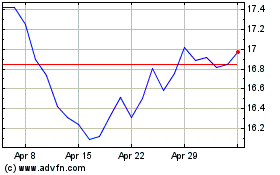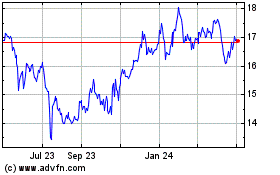Investors Circle Largest Corporate Cash Hoard Ever
December 04 2020 - 8:29AM
Dow Jones News
By Sebastian Pellejero
U.S. companies are sitting on the largest pile of cash ever.
Investors are trying to gauge how they are going to use it.
Cash holdings at nonfinancial companies grew to a record $2.1
trillion at the end of June, according to a recent report from
Moody's Investors Service. That is up 30% from that time last year
and higher than the previous peak of nearly $2 trillion in 2017.
Among the biggest hoarders: AT&T Inc. and Delta Air Lines Inc.,
which each held more than $15 billion at the end of June.
Other measures show some of America's largest companies
continued to hang on to record cash stockpiles at the end of the
third quarter. The amount held by S&P 500 companies not in the
financial, transportation or utilities sectors is expected to total
around $1.9 trillion, according to data compiled by S&P Dow
Jones Indices. That is the most cash ever held by that group in
data going back to 1980.
Cash hoards swelled this year after companies issued
record-breaking amounts of debt to bolster their balance sheets
against the Covid-19 pandemic's disruptions. As of Nov. 30,
companies had sold more than $2 trillion of investment-grade and
high-yield bonds -- the most on record in data going back to 2006
-- according to LCD, a unit of S&P Global Market
Intelligence.
At the same time, many cut share repurchases, dividends or
capital expenditures. Now that is starting to reverse, raising
hopes for moves such as buybacks, which can drive share prices
higher, and paying down debt, which reduces risk for
bondholders.
Wall Street analysts expect companies to start dipping into more
of their cash next year. Some investment-grade companies have taken
initial steps to lower their debt loads, while continuing to hoard
cash in anticipation of a surge in infections this winter,
according to a BofA Securities report.
Some investors believe that firms will spend on capital projects
or hire more employees rather than paying down debt, given that the
Federal Reserve expects to keep interest rates near zero for the
near future.
"It doesn't make sense for cash-laden companies to pay down debt
in this interest-rate climate," said David Kotok, chief investment
officer at Cumberland Advisors. "That cash is going to be put to
more shareholder-friendly uses."
Another option: mergers and acquisitions. A flurry of deal
activity, including S&P Global Inc.'s $44 billion agreement to
buy IHS Markit Ltd. and Facebook Inc.'s move to purchase Kustomer,
indicates more companies are looking to expand as the U.S. economy
continues to recover.
M&A activity remains historically low for the fourth
quarter, indicating many companies still hesitate to pursue big
purchases at this moment. As of Monday, around $313 billion in
acquisitions have been announced during the fourth quarter,
according to Dealogic, the lowest amount for that period since
2013.
"The unintended consequence of this situation is all of a sudden
companies have a lot of cash," said Thomas Majewski, managing
partner at Eagle Point Credit Management. "That money burns a hole
in companies' pockets quickly, so they will be looking to be
acquisitive next year."
Write to Sebastian Pellejero at sebastian.pellejero@wsj.com
(END) Dow Jones Newswires
December 04, 2020 08:14 ET (13:14 GMT)
Copyright (c) 2020 Dow Jones & Company, Inc.
AT&T (NYSE:T)
Historical Stock Chart
From Mar 2024 to Apr 2024

AT&T (NYSE:T)
Historical Stock Chart
From Apr 2023 to Apr 2024
